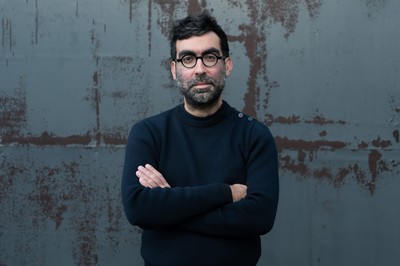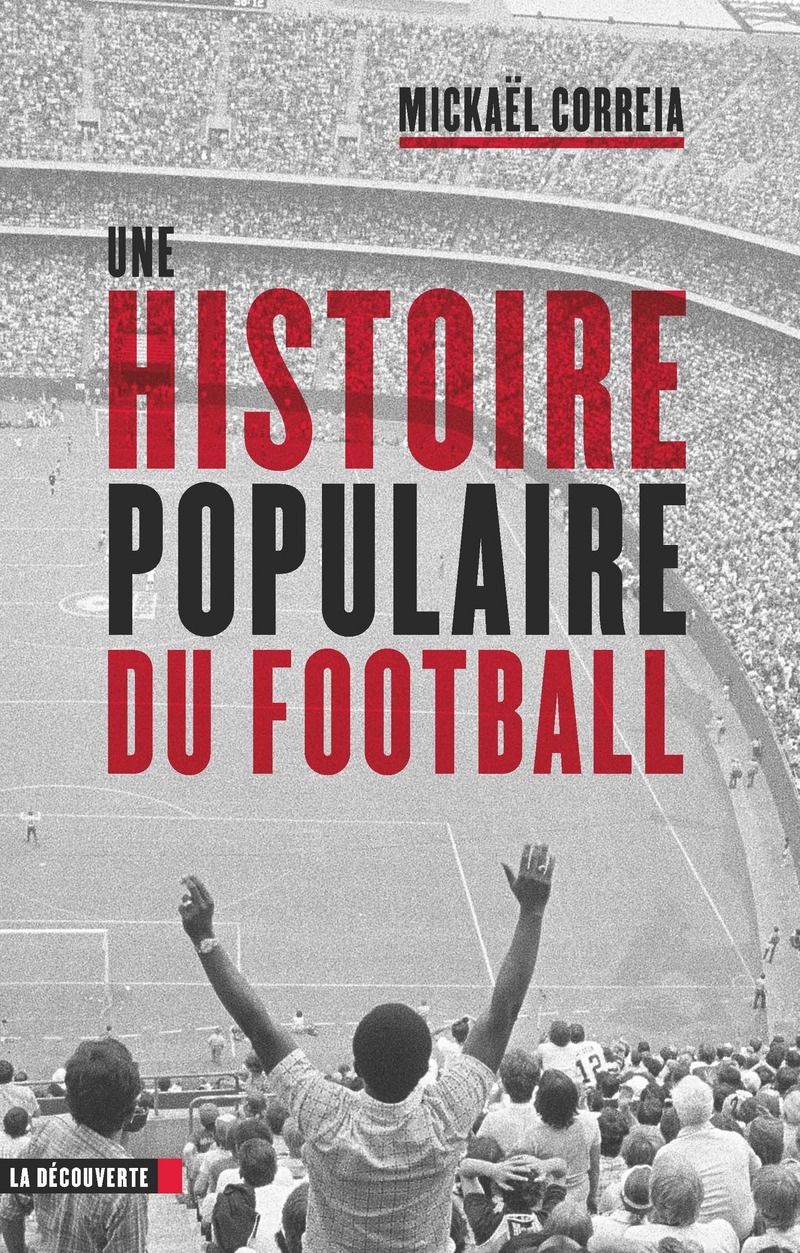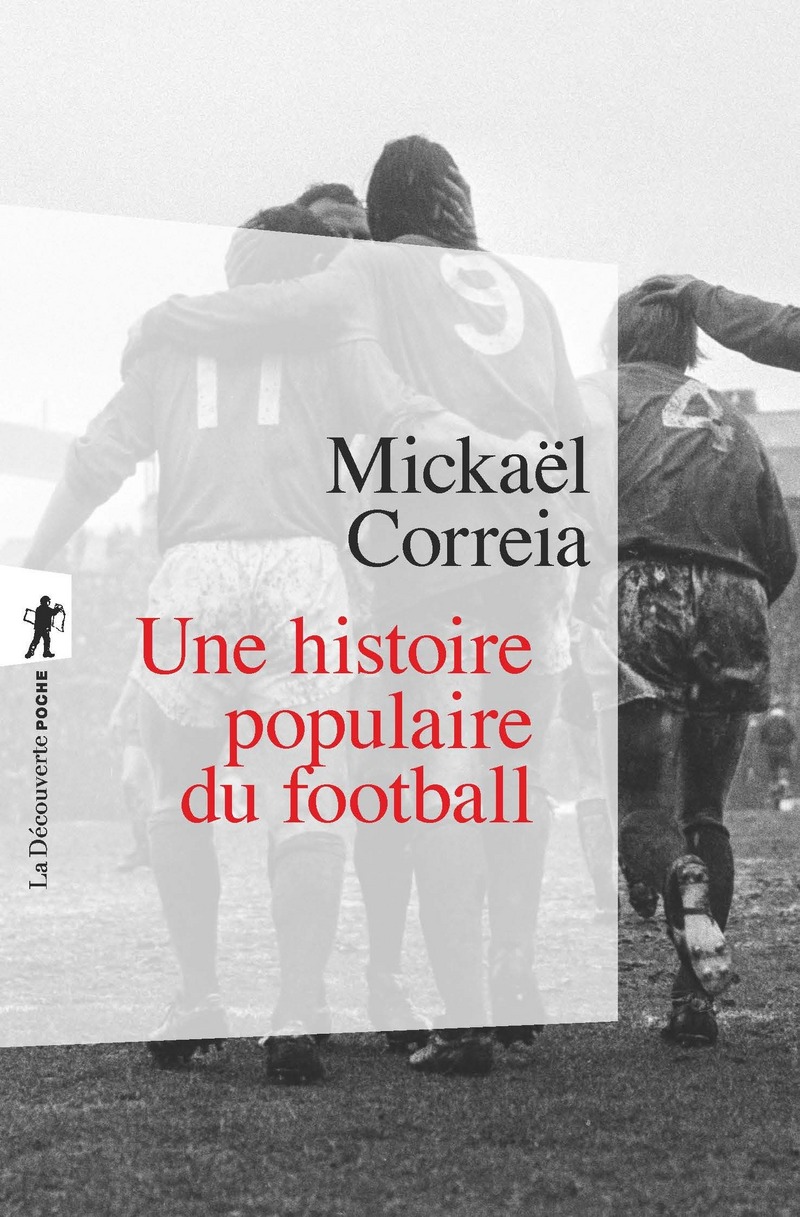Une histoire populaire du football
Mickaël Correia
De l'Angleterre à la Palestine, de l'Allemagne au Mexique, du Brésil à l'Égypte, de la France à l'Afrique du Sud, ce livre raconte une autre histoire du ballon rond, depuis ses origines jusqu'à nos jours.
Le football ne se résume pas au foot-business : depuis plus d'un siècle, il a été un puissant instrument d'émancipation pour les ouvriers, les féministes, les militants anticolonialistes, les jeunes des quartiers populaires et les contestataires du monde entier.
L'auteur retrace le destin de celles et ceux qui, pratiquant ce sport populaire au quotidien, en professionnels ou en amateurs, ont trop longtemps été éclipsés par les équipes stars et les légendes dorées. Prenant à contre-pied les clichés sur les supporters de foot, il raconte aussi l'étonnante histoire des contre-cultures footballistiques nées après la Seconde Guerre mondiale, des hooligans anglais jusqu'aux ultras qui ont joué un rôle central dans les printemps arabes de 2011. En proposant une histoire " par en bas ", en s'attachant à donner la parole à tous les protagonistes de cette épopée, Mickaël Correia rappelle que le football peut être aussi généreux que subversif.

Nb de pages : 432
Dimensions : 15.4 * 24 cm
ISBN numérique : 9782348058677
 Mickaël Correia
Mickaël Correia


 Actualités
Actualités

- FRANCE INTER - L'oeil du tigre
- FRANCE INFO - A livre ouvert
- RADIO CAMPUS PARIS - La matinale de 19h
- RTS - Tribu
- NOVA - Plus près de toi
- TV5 MONDE - JT de 11h
- RTBF - Séquence ouverte
- RADIO CANADA - Plus on est de fous, plus on lit !
- RMC - Afterfoot
- ARTE - Square Idée
- FRANCE INTER - Un jour dans le monde
- MEDIAPART
- RCF - La Suite de l'Histoire
- RADIO ALIGRE - Voix contre oreille
- FRANCE CULTURE - Affaires étrangères
- [ACTUALITÉ] Le sport EST politique
Extraits presse 

2018-03-05 - CQFD
Avec Une histoire populaire du football, Mickaël Correia propose une chronique alternative et politique du ballon rond. À contre-pied du footbusiness, l'auteur raconte comment ce sport est depuis plus d'un siècle un instrument d'émancipation et de contestation aux quatre coins du monde.
2018-03-12 - Nicolas Guillermin - L'Humanité
Pourquoi il faut l'acheter.
Pour ne pas oublier que le football n'a pas toujours été qu'une affaire de business, que depuis plus d'un siècle il a pu être le porte-drapeau des ouvriers, des femmes et de nombre d'opprimés de tout genre. Que le ballon rond a pu servir des causes telles que l'anticolonialisme, la résistance au franquisme ou l'autogestion. C'est cet autre football que l'auteur nous fait découvrir et aimer.
2018-03-13 - France Football
Dans sa foisonnante Histoire populaire du football, l'auteur remonte aux origines de la discipline pour montrer à quel point elle est devenue, depuis le XIXe siècle, une prodigieuse " arme d'émancipation ". Tout en dressant un inventaire des contre-cultures footballistiques, il souligne le caractère éminemment subversif de ce sport " construit par en bas " et devenu un efficace instrument lors des luttes sociales. [...]
L'un des mérites de ce livre touffu est d'offrir une vue panoramique sur cette " culture alternative " (actionnariat populaire, coopératives de supporteurs, nouvelles pratiques de jeu comme le foot à 7), aux antipodes du foot business.
2018-03-14 - Rémi Dupré - Le Monde
Mickaël Correia a fait de son engagement sportif une démarche quasi citoyenne. Ce journaliste de 34 ans raconte dans Une histoire populaire du football comment le ballon rond a été une poche de résistance libertaire contre les institutions qui cherchaient à l'encadrer, les régimes politiques qui utilisaient sa popularité, les puissances financières qui voulaient en tirer profit. Son livre est un voyage.
2018-03-14 - Aurélien Ferenczi - Télérama
Une véritable épopée alternative et politique du football.
2018-06-04 - Lire
C'est l'Howard Zinn de la balle au pied.
2018-07-02 - Cyril Pocréaux - Fakir
Table des matières 

Introduction. Terrains de foot, terrains de lutte
L'autre face du football
Social Football Club
I / Défendre. Résistances ouvrières contre l'ordre bourgeois
1. Et le football fut. Ballons émeutiers et contrôle social
Violence politique et justice populaire
Entre répression et domestication
Un football sous enclosures
2. Normaliser les corps, modeler les esprits. Naissance d'un sport industriel
Former les
gentlemen
Des " machines bien huilées "
3. Le jeu du peuple. Le football comme trait culturel de la working class
La " première place dans le cœur du peuple "
Passe décisive
" The Outcast FC "
Football Railway Company
4. Les Munitionnettes. L'épopée des premières footballeuses britanniques
Sous le joug de la domination masculine
Des chaînes de montage aux terrains verts
" De bien meilleures frappeuses "
Rappel à l'ordre masculin
5. Classe contre classe. Le football ouvrier en France, extension du domaine de la lutte
Phobie sociale, valeurs martiales
Jouer plus pour travailler plus
Un nouveau terrain de lutte ?
Balle au pied, poing levé
Vers un football antifasciste
II / Attaquer. À l'assaut des dictatures
6. " Une petite façon de dire "non' ".
Italie, URSS, Espagne : les stades dans les régimes totalitaires
Chemises noires et maillots bleus
Entre sport-spectacle et spectacle fasciste
Un indomptable football soviétique
" À bas les flics ! "
Real politique
Le Camp Nou, un refuge de la résistance antifranquiste
7. Balle au pied contre main de fer. Résistances footballistiques à la domination nazie
Un nouveau football pour une Nouvelle Allemagne
Un grain de sable dans la machine à propagande
Un homme de papier face au régime de fer
Le " Match de la Mort "
Résistances en eaux troubles
Football clandestin, armes au poing
8. La " démocratie corinthiane ". Ballon rond et autogestion contre la dictature brésilienne
Rompre avec l'ordre établi
Maillot antiautoritaire
Déborder la junte militaire
9. En première ligne, place Tahrir. Les supporters Ultras Ahlawy au cœur de la révolution égyptienne de 2011
De l'anticolonialisme à la mise sous tutelle
Une jeunesse autonome
Tous à Tahrir !
" Oh, Conseil des Salauds "
Irrécupérables
III / Dribbler. Déjouer le colonialisme
10. Le Onze de l'indépendance algérienne.
Une lutte de libération en crampons
Football et libération nationale
L'échappée belle
Fellaghas du ballon
11. Quand la Palestine occupe le terrain. Le football, une arme politique aux mains du peuple palestinien
Restrictions de mouvement
Le parcours du combattant
Un terrain contesté
Carton rouge antiapartheid
Un football gazaoui par la bande
12. Dribbler, un art décolonial. Identités afro-brésiliennes et résistances indigènes dans le football
" Quelque chose qui rappelle la danse "
Dribbleur Social Club
La brèche amérindienne
Ballons zapatistes et rébellion indigène
13. Mettre le colonialisme hors jeu. Football et luttes d'émancipation en Afrique subsaharienne
Le club, un foyer de contestation
Pressing anticolonial
Football des townships contre soccer afrikaner
IV / Supporter. Passions collectives et cultures populaires
14 / You'll never walk alone. Hooliganisme et sous-cultures de tribunes en Grande-Bretagne
Un public
respectable
Faire foule pour renverser le monde
La maladie anglaise
Le tournant du Heysel
Gentrifier pour mieux pacifier
15 / Le douzième homme. Le mouvement ultra italien : du militantisme politique à l'autonomie des supporters
Du spectateur au supporter
Virage à gauche
Calcio dell'arte
Police partout, liberté nulle part
16. " Dieu et le diable ". Maradona, entre passion populaire et culte de supporters
L'agitateur
criollo
Divinité footballistique
Santa Maradona
17. " Nous sommes des amants, pas des combattants ". Les ultras d'Istanbul face au pouvoir turc
Des stades de foot à la place Taksim
Un football sous la coupe d'Erdoğan
Cohésion sociale contre clivage martial
V / Déborder. Face à l'industrie du football : lutter et inventer
18. Le football aux footballeurs !
De Mai 68 à la révolte des amateurs
" Les joueurs sont des esclaves "
Occupy Iéna
Sous les pelouses, la plage ?
Jouer sans entraves
19. Tacler le sexisme. Le football féminin contre le patriarcat sportif français
Un souffle d'émancipation
Un football féminin qui tourne mâle
Nos désirs font désordre
Maltraitance institutionnelle
Un bastion qui se fissure
20. " Ici, c'est du foot punk ". Clubs en coopératives et actionnariat populaire en Angleterre
In fans we trust
Un autre football en actions
" Notre club, nos règles "
21. Jouer sur l'aile gauche. Le FC Sankt Pauli de Hambourg ou les pirates du foot-business
Quartier rouge et militants
Autonomen
Les flibustiers de la Ligue
Contre le mercantilisme et son monde
22. Ballons sauvages, ballons en marge. Le football de rue à contre-pied
du football institutionnel
Au Sénégal, un football au cœur du quartier
Un
futebol sans terrain ni limites
Le foot des cités : jouer pour exister
Les feintes du foot-business
Notes
Remerciements.















